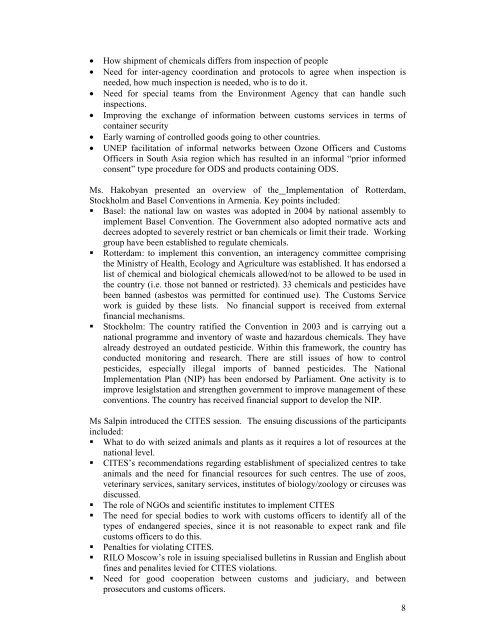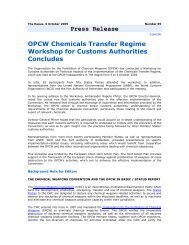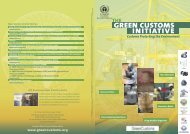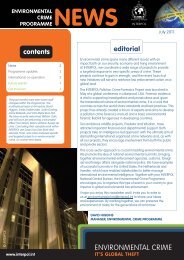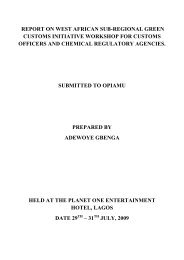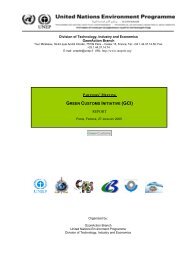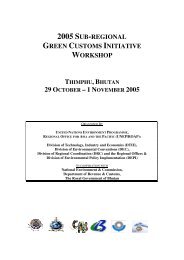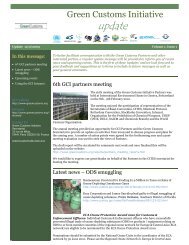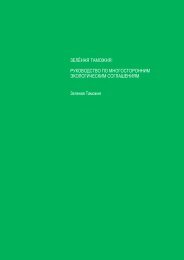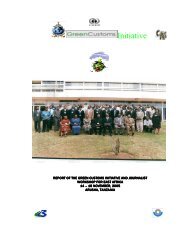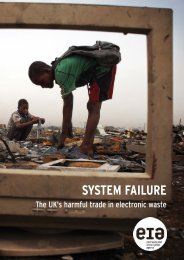Tbilisi - Green Customs Initiative
Tbilisi - Green Customs Initiative
Tbilisi - Green Customs Initiative
Create successful ePaper yourself
Turn your PDF publications into a flip-book with our unique Google optimized e-Paper software.
• How shipment of chemicals differs from inspection of people• Need for inter-agency coordination and protocols to agree when inspection isneeded, how much inspection is needed, who is to do it.• Need for special teams from the Environment Agency that can handle suchinspections.• Improving the exchange of information between customs services in terms ofcontainer security• Early warning of controlled goods going to other countries.• UNEP facilitation of informal networks between Ozone Officers and <strong>Customs</strong>Officers in South Asia region which has resulted in an informal “prior informedconsent” type procedure for ODS and products containing ODS.Ms. Hakobyan presented an overview of the Implementation of Rotterdam,Stockholm and Basel Conventions in Armenia. Key points included: Basel: the national law on wastes was adopted in 2004 by national assembly toimplement Basel Convention. The Government also adopted normative acts anddecrees adopted to severely restrict or ban chemicals or limit their trade. Workinggroup have been established to regulate chemicals. Rotterdam: to implement this convention, an interagency committee comprisingthe Ministry of Health, Ecology and Agriculture was established. It has endorsed alist of chemical and biological chemicals allowed/not to be allowed to be used inthe country (i.e. those not banned or restricted). 33 chemicals and pesticides havebeen banned (asbestos was permitted for continued use). The <strong>Customs</strong> Servicework is guided by these lists. No financial support is received from externalfinancial mechanisms. Stockholm: The country ratified the Convention in 2003 and is carrying out anational programme and inventory of waste and hazardous chemicals. They havealready destroyed an outdated pesticide. Within this framework, the country hasconducted monitoring and research. There are still issues of how to controlpesticides, especially illegal imports of banned pesticides. The NationalImplementation Plan (NIP) has been endorsed by Parliament. One activity is toimprove lesiglstation and strengthen government to improve management of theseconventions. The country has received financial support to develop the NIP.Ms Salpin introduced the CITES session. The ensuing discussions of the participantsincluded: What to do with seized animals and plants as it requires a lot of resources at thenational level. CITES’s recommendations regarding establishment of specialized centres to takeanimals and the need for financial resources for such centres. The use of zoos,veterinary services, sanitary services, institutes of biology/zoology or circuses wasdiscussed. The role of NGOs and scientific institutes to implement CITES The need for special bodies to work with customs officers to identify all of thetypes of endangered species, since it is not reasonable to expect rank and filecustoms officers to do this. Penalties for violating CITES. RILO Moscow’s role in issuing specialised bulletins in Russian and English aboutfines and penalites levied for CITES violations. Need for good cooperation between customs and judiciary, and betweenprosecutors and customs officers.8


